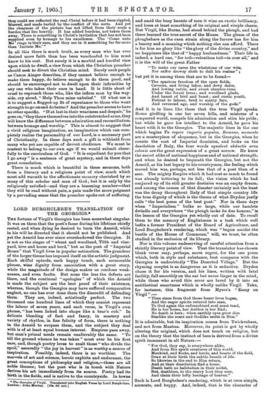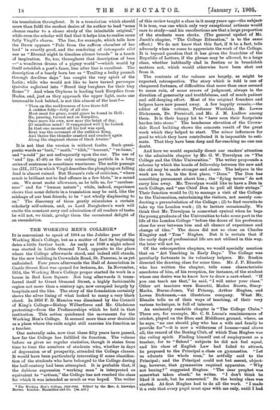THE fortune of Virgil's Georgics has been somewhat singular. It
was on them that the poet's fame during his lifetime chiefly rested, and when dying he desired to burn the Aeneid, while in his will he directed that it should not be published. And yet the Aeneid has ever since overshadowed the Georgics. It is not as the singer of "wheat and woodland, Tilth and vine- yard, hive and horse and herd," but as the poet of "Imperial Rome" that Virgil lives in popular estimation. The grandeur of the larger theme has imposed itself on the artistic judgment. Each skilful episode, each happy touch, each memorable phrase, wins dignity from association with a great story, while the magnitude of the design makes us condone weak- nesses, and even faults. But none the less the defects are there, and the continual " apologies " of which the Aeneid is made the subject are the best proof of their existence, whereas, though the Georgics may have suffered comparative neglect, no one has ever done them the discredit of defending them. They are, indeed, artistically perfect. The two thousand one hundred lines of which they consist represent the labour of seven years, and each verse, in Virgil's own phrase, "has been licked into shape like a bear's cub." In delicate blending of fact and fancy, in mastery and variety of rhythm, in fine felicity of form, there is nothing in the Aeneid to surpass them, and the subject they deal with is of at least equal human interest. Empires pass away, but man's primal needs remain unalterably the same. "To till the ground whence he was taken" must ever be his first care, and, though poetry loves to exalt those "who divide the spoil," assuredly "the joy in harvest" is as worthy a source of inspiration. Possibly, indeed, there is no worthier. The marvels of art and science, heroic exploits and endurance, the great conceptions of philosophy and religion,—these are all noble themes ; but the poet who is in touch with Nature derives his art immediately from its source. Poetry had its birth in the fields, and is native to the countryside. In towns • The Georgics of Virgil. Translated into English Verse by Lord Bitrghelere. London : John Murray. [10s. 6d. net.]
Virgil" :— But Virgil, like Burns, had stood behind the plough, and had there learned the true secret of the Muses. The gleam of the ploughshare as the oxen strain along the furrow has for him a beauty and a meaning which nothing else can afford. There is for him no glory like "the glory of the divine country," and no happiness like that of "happy husband men." Their life is, indeed, a hard one, "for toil—relentless toil—is over all," and it is the will of the great Father "To make our cares the whetstone of our wits, Nor suffer drowsy sloth to dull his realms" ; but yet it is among them that are to be found-
" The spacious freedom of the open fields, Caverns, and living lakes, and dewy dales, And lowing cattle, and sweet slumber-time Under the forest trees ; and woodland glade, And haunt of bird and beast ; and rustic youth, Patient to labour, bred to scanty fare, And reverend age, and worship of the gods."
And it is in lines like these that the true Virgil speaks. Rome girdling in one her seven hills, and mistress of a conquered world, compels his admiration and stirs his pride ;
but while he gave hie intellect to the Aeneid, he gave his heart with it to the G-eorgics. The majestic lines in the one which begins Tu regere imperio poputos, Romane, memento are a masterpiece of eloquence, but in the Georgics, when he counts the cost of Imperial dominion, and looks on the desolation of Italy, the four words sgualent abductis arm colon is are the great expression of a great sorrow. He knew
the secret alike of national happiness and of national strength, and when he desired to bequeath the Georgics, but not the Aeneid, as his last legacy to his countrymen, the feeling which moved him was, perhaps, not less that of a poet than of a seer. The mighty Empire which it had cost so much to found was already tottering to its fall ; the vision which he had conjured up of its still greater destinies was an empty dream, and among the causes of that disaster certainly not the least was the decay throughout Italy of that simple country life the true dignity of which is the theme of what Dryden justly calls the best poem of the best poet." Nor in these days when " Imperialism " bulks so large, while our hamlets dwindle and everywhere "the plough lacks its due honour," is the lesson of the Georgics yet wholly out of date. To recall them to the memory of Englishmen is a task which well befits a former President of the Board of Agriculture, and Lord Burghclere's rendering, which was "begun amidst the bustle of the House of Commons," will, we trust, be often studied in the seclusion of its library.
Nor is this volume undeserving of careful attention from a strictly literary point of view. That the translator has chosen blank verse may, perhaps, move regret, for the one poem which, both in style and substance, best compares with the Georgics is undoubtedly "The Deserted Village." But the rhyming couplet is as dangerous as it is seductive. Dryden
chose it for his version, and his lines, written with fatal facility, fall smoothly on the ear but never linger in the mind; while those who avoid this error are lured by it into an
antithetical smartness which is wholly unlike Virgil. Take, for instance, this fragment from Myers's "Essay on
"Then since from God those lesser lives began, And the eager spirits entered into man, To God again the enfranchised soul must tend, He is her home, her Author is her End ; No death is hers ; when earthly eyes grow dim Starlike she soars and Godlike melts in Him."
It is admirable, but its inspiration comes from Twickenham, and not from Mantua. Moreover, its point is got by wholly altering the original, which does not touch on religion, but on the theory that the instinct of bees is derived from a divine spirit immanent in all Nature :— "For God, they say, is everywhere alike,
And from His spirit creatures of this world, Mankind, and flocks, and herds, and beasts of the field, Draw at their birth the subtle breath of life.
So likewise in the end to Him return,
And at their dissolution find a home.
Death hath no habitation in their midst, But, deathless, to the starry host they soar, And claim their lofty heritage of heaven."
Such is Lord Burghclere's rendering, which is at once simple, accurate, and happy. And, indeed, that is the character of chance reader to a closer study of the inimitable original," while even the scholar will find that it helps him to realise more fully Virgil's charm. The line, for example, which tells how
the Dawn appears "Pale from the saffron chamber of her lord" is exactly good, and the rendering of inteinpesta silet nos as "Eternal night in timeless silence broods" is a touch of inspiration. So, too, throughout that description of bees —" a wondrous drama of a pigmy world "—which would by
itself establish a poet's fame, line after line is excellent. The description of a basely born bee as "Trailing a bulky paunch through deedless days" has caught the very spirit of the
Latin ; while who would not like to have turned parvosque Quirites sufficiunt into "Breed tiny burghers for their tiny Rome" P And when Orpheus is leading back Eurydice from
Hades, and, just as they approach the upper light, casts one irrevocable look behind, is not this almost of the best P.—
" Then on the recklessness of love there fell
A sudden folly—folly of all else
Most meet for grace, could grace be found in Hell :
He, pausing, turned and on Eurydice, Once more his own, now near the brink of day, (0 mindless mind ! 0 vanquished will !) he looked.
In that one moment all his toil was sped,
Bent was the covenant of the ruthless King'
And thrice the thunder crashed and crashed again Along the stagnant shores of black Averne."
It is not that the version is without faults. Such quasi-
poetic words as "lush," "math," tilth," " horrent," " re-lume," and " a-cold " jar not unfrequently upon the ear. The use of ' and " (pp. 47-48) as the only connecting particle in a long 3eries of sentences is sometimes wearisome. The noble passage too (ILL, 517) in which Virgil describes the ploughing-ox falling lead is almost ruined. But Horace's rule of criticism, " where much is brilliant not to find offence in a few blots," is a sound one. We must make allowance, as he tells us, for "careless- ness" and for "human nature"; while, indeed, experience shows that some defects in a translation may be said, like the mishaps of our best friends, to be "not wholly displeasing to us." The discovery of them gently stimulates a certain scholarly self-esteem, and, as Lord Burghclem's work will excite the constant envy and admiration of all readers of taste, he will not, we think, grudge them the occasional delight of an emendation.
THE WORKING MEN'S COLLEGE.*















































 Previous page
Previous page